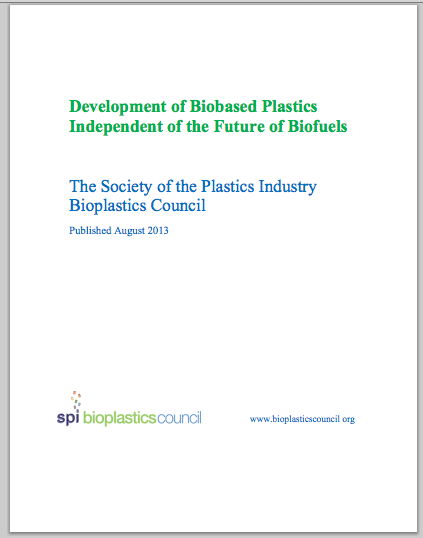The green blogger will be in Boston for the rest of the week attending (and will be presenting) at the ICIS World Purchasing Summit. I will do a live blog of the event, where most of the major focus will be on the impact of shale gas. Follow me on twitter as well under #Purchasing13 starting Thursday, September 12.
Unfortunately the blog will be a bit sparse as I continue to work on Tecnon OrbiChem’s first publication of our Bio-Materials & Intermediates newsletter. This will come out next week Friday.
In the meantime, here is an interesting short study from the Society of the Plastics Industry Bioplastic Coucil talking about the future of bioplastics. According to the study, the bioplastic industry will develop regardless of what happens with biofuels. Why?
- Bioplastics is emerging in a world of mature and sometimes obsolete manufacturing facilities. Bioplastic players have the opportunity to leverage and repurpose existing infrastructure
- Bioplastics is already facing reduced market uncertainties with well-established applications for plastics
- Shale gas can directly enhance the economic drivers for biobased equivalents of other polymers such as polyesters and polyamides.
- The potential environmental and societal impacts of bioplastics will not be as large as the impacts of the biofuels industry.
- The smaller scale bioplastic industry could move rapidly in terms of innovation and commercialization of new technologies compared to the larger-scale biofuels.
Here are other market studies and bioplastic information that might be useful for your research:
- Consumer Pressure and Legislation Increasing Demand for Biodegradable Plastics by Nearly 15 Percent Annually During 2012 to 2017 in North America, Europe and Asia– Mounting consumer pressure and legislation such as plastic bag bans and global warming initiatives will increase demand for biodegradable polymers (plastics) in North America, Europe and Asia from 269,000 MT in 2012 to nearly 525,000 MT in 2017, representing an average annual growth rate of nearly 15 percent during the five-year period 2012-2017.
- Production of Chinese Biodegradable Plastics to Reach 650K Tons by 2015 – The production of Chinese biodegradable plastics is expected to hit 650,000 tons/a by 2015. Among them, the newly-built 10 ktpa PBS Project of Youth Chemical Co., Ltd., a subsidiary of Jiangsu Yangnong Chemical Group, started construction in 2011, and expected to be completed and commissioned in 2013; In September 2012, Zibo Qixiang Tengda Chemical Co., Ltd raised funds for new 150 ktpa PBS devices and raw materials related devices through non-public offering of stock, with a total construction period of 2.5 years.
- New scientific arguments in favour of industrial use of food crops – According to Germany-based think-tank nova-Institute, studies show that many food crops are more land-efficient than non-food crops as they require less land to produce the same amount of fermentable sugar than non-food crops or so-called second generation feedstock such as lignocelluloses. According to European Bioplastics, the trade group is in favor of promoting the use of second or even third generation feedstock for industrial purposes. “However, as long as food crops continue in many cases to represent the most efficient feedstock by far, discrediting their use would be misguided and a step in the wrong direction in achieving the European Commission sustainability targets.”
- Production Capacities for Bio-based Polymers in Europe – Status Quo and Trends towards 2020 – While Europe shows strong demand for bioplastics, production tends to take place in Asia and America. The European Union’s relatively weak position in the production of bioplastics is largely the consequence of unfavorable political framework for the industrial material use of biomass.
- Cereplast and Bioplastics: The Next Five Years – Cereplast believes the bioplastic market will represent 30% of the overall plastics industry within the next 25 years. In 2012, the total addressable market for conventional plastics was $1 trillion. Of this, the bioplastics industry is expected to represent $10bn by 2020.






One response to “Biofuels will not impact bioplastic developments”
[…] The green blogger will be in Boston for the rest of the week attending (and will be presenting) at the ICIS World Purchasing Summit. I will do a live blog of the event, where most of the major focu… […]